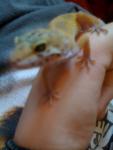» Site Navigation

0 members and 844 guests
No Members online
Most users ever online was 47,180, 07-16-2025 at 05:30 PM.
» Today's Birthdays

» Stats

Members: 75,947
Threads: 249,146
Posts: 2,572,383
Top Poster: JLC (31,651)
|
View Poll Results: Have you ever caught salmonella from your reptiles?
- Voters
- 145. You may not vote on this poll
-
Yes, despite having taken all efforts to prevent it.
-
Yes, but I wasn't too careful about avoiding it in the first place.
-
No, and I take all measures to make sure I never do.
-
No... Even though I am not as careful about avoiding it as I could be.
-
Registered User


Re: Salmonella. Have YOU caught it from your reptiles?
 Originally Posted by aldebono

Ever have to siphon the turtle tank and get the water started the old fashion way? Sometimes the water gets in your mouth 
lol this happens to me sometimes when i change my goldfish's water 
-
The Following User Says Thank You to francisco_24 For This Useful Post:
-
Re: Salmonella. Have YOU caught it from your reptiles?
 Originally Posted by aldebono

Just don't tell them that they can "Nom" of the side of the shell 
I haven't really been too careful about salmonella.
Ever have to siphon the turtle tank and get the water started the old fashion way? Sometimes the water gets in your mouth 
Nooo, I'd never put my mouth on the siphon!
My siphon has a pump on it so I just press it a few times and the water comes out 
[6.18 Ball Pythons ]
Clown, Champagne, Pied, Pastel Lesser, Enchi, Fire
Albino, Bumble Bee, Pewter, Black Pastel, Lesser, Pastel Het Pied, 2 Mojaves, 2 Pastels Het OG, 2 Spiders, 3 Het Pieds, 3 Normals
-
-
The risk is a lot lower than the reports lead people to believe, however, that does not mean they aren't there. I take very strict precautions, maybe laughably strict to some people, but I grew up in a medical family, so I have heard the worst case scenarios all my life, so they are bound to leave an impression. My mom's first words of warning when I got a snake was to be so careful of infection if it ever bit me, because she has seen people have limbs amputated from an infected cat scratch. Yes, extreme, unlikely, worst case scenario, but when you see and hear that stuff first hand, you really don't want to be the poor soul who becomes and unfortunate statistic. I am never without peroxide and anti bacterial ointment, just in case.
My salmonella prevention is constant cleaning. Because my apartment is so small, I bleach my counters daily and I do not wash any dishes by hand, they all go in the dishwasher. I have one blanket on the couch that is a designated snake blanket that she is allowed to crawl on and that I lay under while I hold her when I watch T.V. and such. I do a full tank clean every other week, where absolutely everything is bleached. I also will not get into bed in the pajama's I was wearing when I held my snake, I will always change them, even if it means more laundry.
It's not like I treat my snake like she is radioactive, I love her and let her crawl all over me, on the carpet, I just am careful afterwards. The risk is low, but that is no reason to be careless. Salmonella is an awful thing to catch, makes the flu look like a head cold. If you are a healthy individual, you won't die or anything, but it will suck. No thank you. I'll use some bleach.
0.1 - Normal ball python, Zola
-
-
I grew up catching lizards and frogs as a child, was raised around herps with my biological father, have kissed many of our ball pythons and dumeril's on the head, and worked at petco for 5 years... with a habit of licking the tips of my fingers to grip paper, or even eating food while also feeding the snakes.... and have never to my knowledge caught salmonella. Either I've been very lucky, or have built up quite the immunity, or both.
Maybe these people that keep catching salmonella are confusing baby tortoises for tiny hamburgers? I can certainly see this as a possibility :p
-
-
Re: Salmonella. Have YOU caught it from your reptiles?
Salmonella is transmitted via feces and is not airborne. Only an infected animal can transmit it through their feces. An animal that hatched from an egg cannot be born infected with it (conceivable for a mammal?). Due to its prevalence in the world and ease of transmission, nearly all domestic animals have some amount of it living in their intestines. Yes, this means most animals swap the bacteria around by making contact with each other's poop. Everyone poops.
We ingest salmonella all the time as it is exists in our kitchens and fridges (it got there from meat and produce). Freezing does not kill it. In small quantities, our stomach acid kills the bacteria and we see no ill effects. To get infected, you need to have a weakened immune system (child, elderly, or ill) and/or ingest a fair quantity of it.
Now let's lump those sets of information together and do a little risk assessment.
Reptile:
Captive bred, individually cared for, individually housed with other sterile animals and cleaned up after. The sources of contamination (meaning the animal actually becomes a carrier) are your own hands, its food, or its poop having exposure to either of the first 2 things and then re-ingested by the animal or yourself in poop form. To get sick from the actual animal would, again, require you to ingest its poop in a high enough quantity to become ill. You typically clean an individual reptile's cage once a week on average, so your exposure is limited to that small window of time.
Your food:
Meat:
Often bred literally into a pile of excrement made by an adult carrier of the bacteria, housed shoulder to shoulder or literally piled on top of other individuals who are literally guaranteed to be carriers, and cleaned up after only to the minimum degree that is required by the law. If the animal was raised in another country, presumably the laws are varying levels of strictness (in terms of cleanliness required in the farming and butchering). The animals are often butchered in the same facility they were raised in and come into contact with a number of instruments and workers who are exposed to large amounts of waste and who are desensitized to its grossness.
Produce:
The same animals mentioned above poop, and that poop is thrown all over the designer lettuce you have on your cobb salad while it's being propagated as fertilizer. It can become contaminated by this poop or by the poop it encounters on the truck to the market, the farmer who grew it, etc. Presumably this produce is grown in another country and, again, the laws may not even require the farmer to rinse the goods between harvest and transport to your local supermarket. Even to make produce look presentable they would only need to worry about rinsing the outer surface of the fruit/vegetable. We eat produce and meat every day, so your exposure is limited to 3 meals a day or however often you eat.
Assuming you don't clean your animal's cage bare handed, pick its poop up with your fingers, and then eat some chicken nuggets bare handed (like the people who work at the farm), it's pretty clear where more risk lies. You won't get salmonella by picking up your snake. Aquatic turtles are high-risk because they literally swim in their own poop if their cage is dirty. This means that simply by picking up the animal you could be exposed to a large enough amount of the bacteria to get infected.
People blow whistles and write articles about reptiles because it gets attention. People do studies on it because they couldn't think of another grant proposal. The bottom line here is that if you don't pick up poop with your bare hands and then eat with them, you're WAY more likely to get salmonella poisoning from your food.
Wall of text crits. It's super effective...
-
The Following 9 Users Say Thank You to MrLang For This Useful Post:
blueberrypancakes (01-08-2012),C&H Exotic Morphs (12-20-2011),cmack91 (12-20-2011),Don (12-21-2011),FalconPunch (12-21-2011),fluffpuffgerbil (01-07-2012),heathers*bps (12-21-2011),JLC (12-20-2011),Redneck_Crow (12-20-2011)
-
BPnet Veteran


No, but I've only kept reptiles for less than a year. I think the whole salmonella thing is way exaggerated, because my sister licks them and hasn't contracted it. Also some times I'll forget to wash my hands. I agree that you're much more likely to get it from food than a reptile/bird.
-
-
BPnet Veteran


I have a dozen reptiles and never one case in my entire household, friends, or family that have handled any of my pets.
-
-
70+ reptiles 10-12 years keeping. Never had it.
-
-
I work with 250 reptiles on a daily basis. Never had salmonella. Yes I even pick poop up with my bare hands. I wash after bc I don't like poo in my nails. I guess i would be more concerned if I was eating the poop/ eating with poo on my hands. I'm way way more concerned with the food I buy at the store than my Herps.
Check out what's new on my website... www.Homegrownscales.com
-
-
I do take SOME precautions... like handwashing after handling mice and buying a separate freezer for the rodents. But while I'm very careful about making other people wash their hands after handling my snakes, I often forget to do it myself.
-
 Posting Permissions
Posting Permissions
- You may not post new threads
- You may not post replies
- You may not post attachments
- You may not edit your posts
-
Forum Rules
|